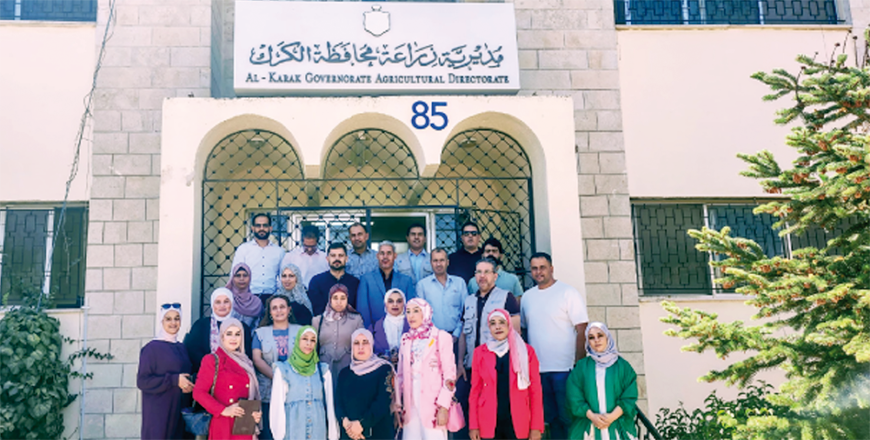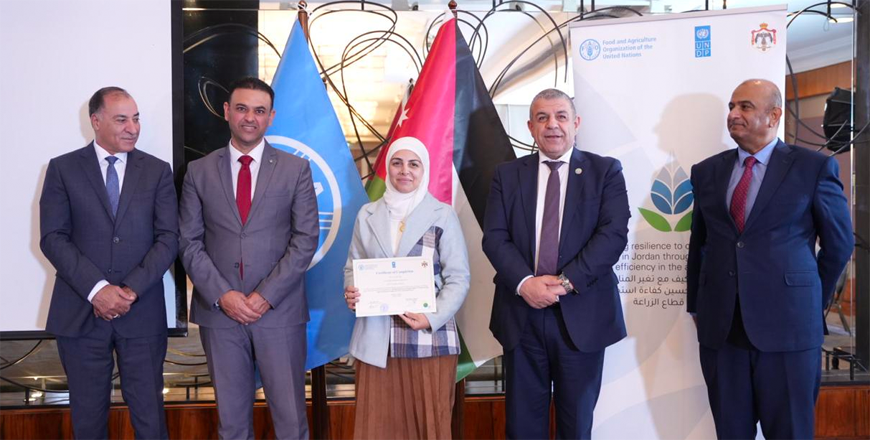You are here
FAO launches climate-smart training course in Karak Governorate
By JT - Aug 12,2024 - Last updated at Aug 12,2024

The training provided by FAO through the BRCCJ project is one of the most important trainings aimed at building the capabilities of agricultural employees (Photo courtesy of FAO)
KARAK — The Food and Agriculture Organisation of the United Nations in Jordan (FAO), in cooperation with the Ministry of Agriculture, launched training course in Karak Governorate in the field of facilitating climate-smart farmer field schools, according to a statement for The Jordan Times.
This course comes within “Building resilience to cope with climate change in Jordan through improving the water use efficiency in the agricultural sector BRCCJ,” funded by the Green Climate Fund (GCF), and implemented by FAO through: Ministries of Water and Irrigation, Agriculture and Environment and the United Nations Development Programme.
Director of the Karak Agriculture Directorate, Maamoun Adaileh welcomed began holding the course in Karak, in which 22 employees participated. He praised the ongoing cooperation between the Ministry of Agriculture and FAO, aimed at developing the agricultural sector in the Kingdom.
Adayleh said: “The training provided by FAO through the BRCCJ project is one of the most important trainings aimed at building the capabilities of agricultural employees with the aim of improving the efficiency of water use in the agricultural sector using the climate-smart field school methodology.” He added, "Some of the practices that the staff of the Directorate of Agriculture and farmers are currently carrying out in order to coexist with the occurring climate change were reviewed, provided that these practices are studied, and their strengths and weaknesses are identified." The course will be held in Karak as a continuation of a training programme launched by FAO in Shobak/ Ma'an Governorate and Madaba Governorate and will be organised in the coming period also in Tafila Governorate, for the purposes of training agricultural extension staff in the four governorates on the climate-smart field school methodology and transferring knowledge. To provide farmers with agricultural technology and practices that can be used to increase water use efficiency in agriculture through field schools that will be implemented later. Building Resilience to Cope with Climate Change in Jordan through improving the water use efficiency in the agricultural sector BRCCJ aims to help Jordan adapt to climate risks and change behaviour towards a more efficient use of water resources, transfer knowledge and enhance the capacity of communities and institutions in Jordan, water sustainability and respond to water needs of vulnerable groups, the statement said.
The $33.25 million project targets the Dead Sea Basin governorates that are particularly vulnerable to climate change and water stress caused by climate change.
Related Articles
AMMAN — As part of efforts to enhance climate change adaptation, mitigate its impacts on agriculture, and ensure sustainable food security,
AMMAN — The Food and Agriculture Organisation of the United Nations (FAO) in Jordan and Mutah University on Sunday signed an agreement where
AMMAN — The Food and Agriculture Organisation (FAO) and Mutah University's Prince Feisal Dead Sea Research Centre launched a training course













